Organizational Behaviour in BBC: Culture, Politics, Power, and Teams
VerifiedAdded on 2024/06/13
|30
|5752
|89
Report
AI Summary
This report provides a comprehensive analysis of organizational behaviour within the BBC, examining the influence of culture, politics, and power on individual and team dynamics. It explores various cultural classifications, including power, role, task, and person cultures, and applies Hofstede's dimensions of culture to understand behavioural impacts. The report also investigates motivational theories, such as Maslow's hierarchy of needs, Herzberg's motivation-hygiene theory, and Vroom's expectancy theory, to identify strategies for motivating individuals and teams to achieve organizational goals. Furthermore, it addresses the importance of effective cooperation, team building, and the identification of barriers to performance within the BBC, offering insights into improving overall organizational effectiveness. Desklib provides access to this and other solved assignments for students.
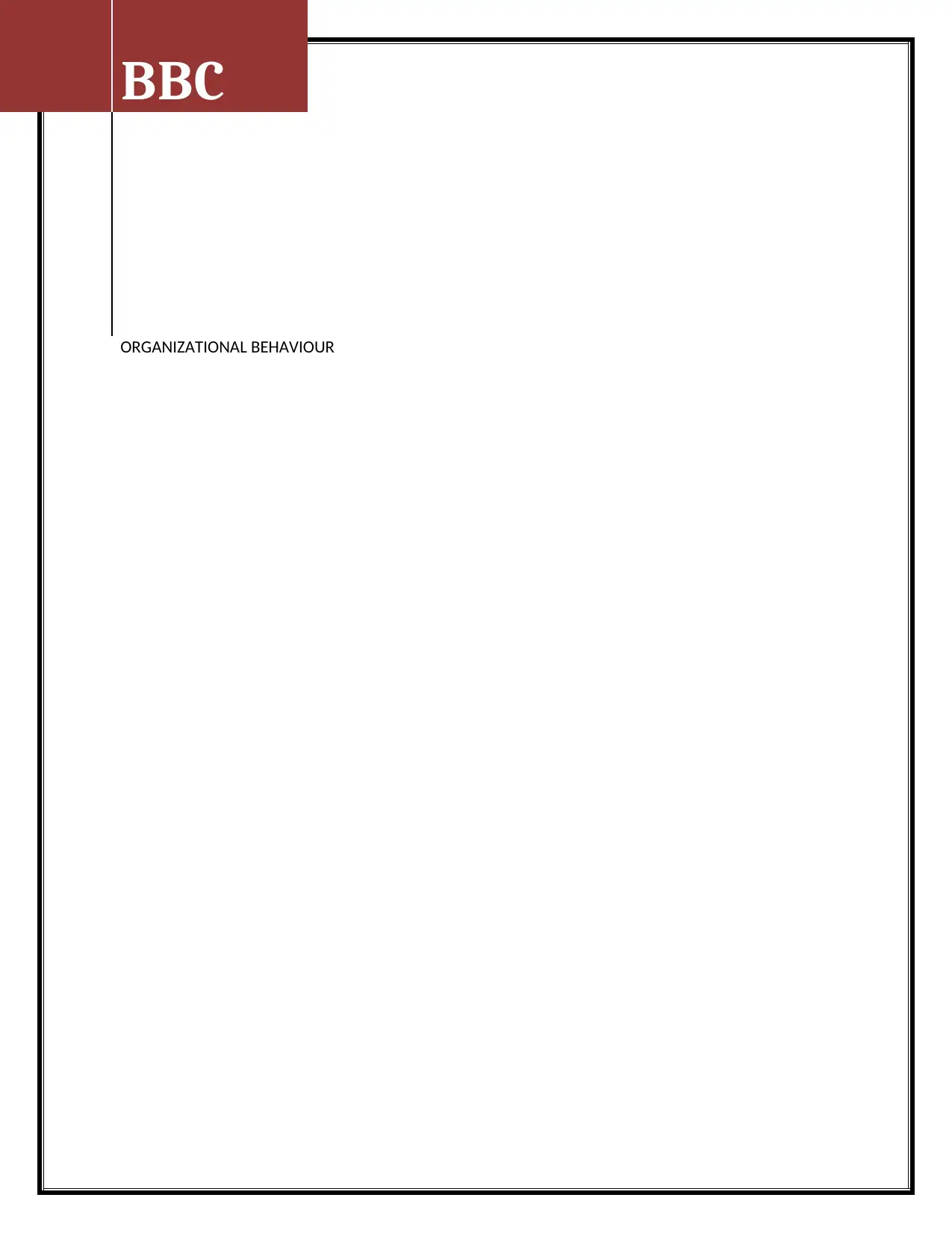
ORGANIZATIONAL BEHAVIOUR
BBC
BBC
Paraphrase This Document
Need a fresh take? Get an instant paraphrase of this document with our AI Paraphraser
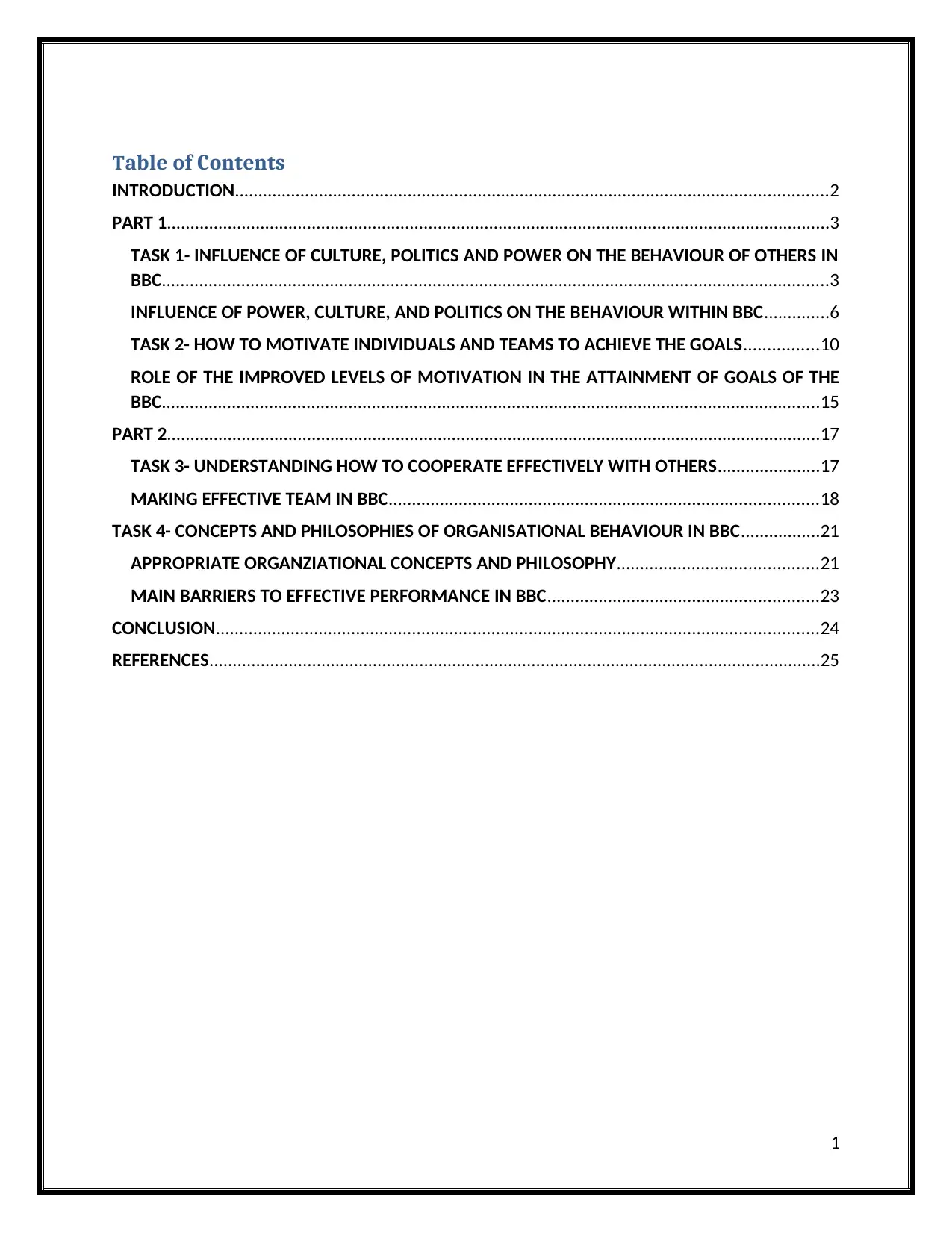
Table of Contents
INTRODUCTION...............................................................................................................................2
PART 1..............................................................................................................................................3
TASK 1- INFLUENCE OF CULTURE, POLITICS AND POWER ON THE BEHAVIOUR OF OTHERS IN
BBC...............................................................................................................................................3
INFLUENCE OF POWER, CULTURE, AND POLITICS ON THE BEHAVIOUR WITHIN BBC..............6
TASK 2- HOW TO MOTIVATE INDIVIDUALS AND TEAMS TO ACHIEVE THE GOALS................10
ROLE OF THE IMPROVED LEVELS OF MOTIVATION IN THE ATTAINMENT OF GOALS OF THE
BBC.............................................................................................................................................15
PART 2............................................................................................................................................17
TASK 3- UNDERSTANDING HOW TO COOPERATE EFFECTIVELY WITH OTHERS......................17
MAKING EFFECTIVE TEAM IN BBC............................................................................................18
TASK 4- CONCEPTS AND PHILOSOPHIES OF ORGANISATIONAL BEHAVIOUR IN BBC.................21
APPROPRIATE ORGANZIATIONAL CONCEPTS AND PHILOSOPHY...........................................21
MAIN BARRIERS TO EFFECTIVE PERFORMANCE IN BBC..........................................................23
CONCLUSION.................................................................................................................................24
REFERENCES...................................................................................................................................25
1
INTRODUCTION...............................................................................................................................2
PART 1..............................................................................................................................................3
TASK 1- INFLUENCE OF CULTURE, POLITICS AND POWER ON THE BEHAVIOUR OF OTHERS IN
BBC...............................................................................................................................................3
INFLUENCE OF POWER, CULTURE, AND POLITICS ON THE BEHAVIOUR WITHIN BBC..............6
TASK 2- HOW TO MOTIVATE INDIVIDUALS AND TEAMS TO ACHIEVE THE GOALS................10
ROLE OF THE IMPROVED LEVELS OF MOTIVATION IN THE ATTAINMENT OF GOALS OF THE
BBC.............................................................................................................................................15
PART 2............................................................................................................................................17
TASK 3- UNDERSTANDING HOW TO COOPERATE EFFECTIVELY WITH OTHERS......................17
MAKING EFFECTIVE TEAM IN BBC............................................................................................18
TASK 4- CONCEPTS AND PHILOSOPHIES OF ORGANISATIONAL BEHAVIOUR IN BBC.................21
APPROPRIATE ORGANZIATIONAL CONCEPTS AND PHILOSOPHY...........................................21
MAIN BARRIERS TO EFFECTIVE PERFORMANCE IN BBC..........................................................23
CONCLUSION.................................................................................................................................24
REFERENCES...................................................................................................................................25
1
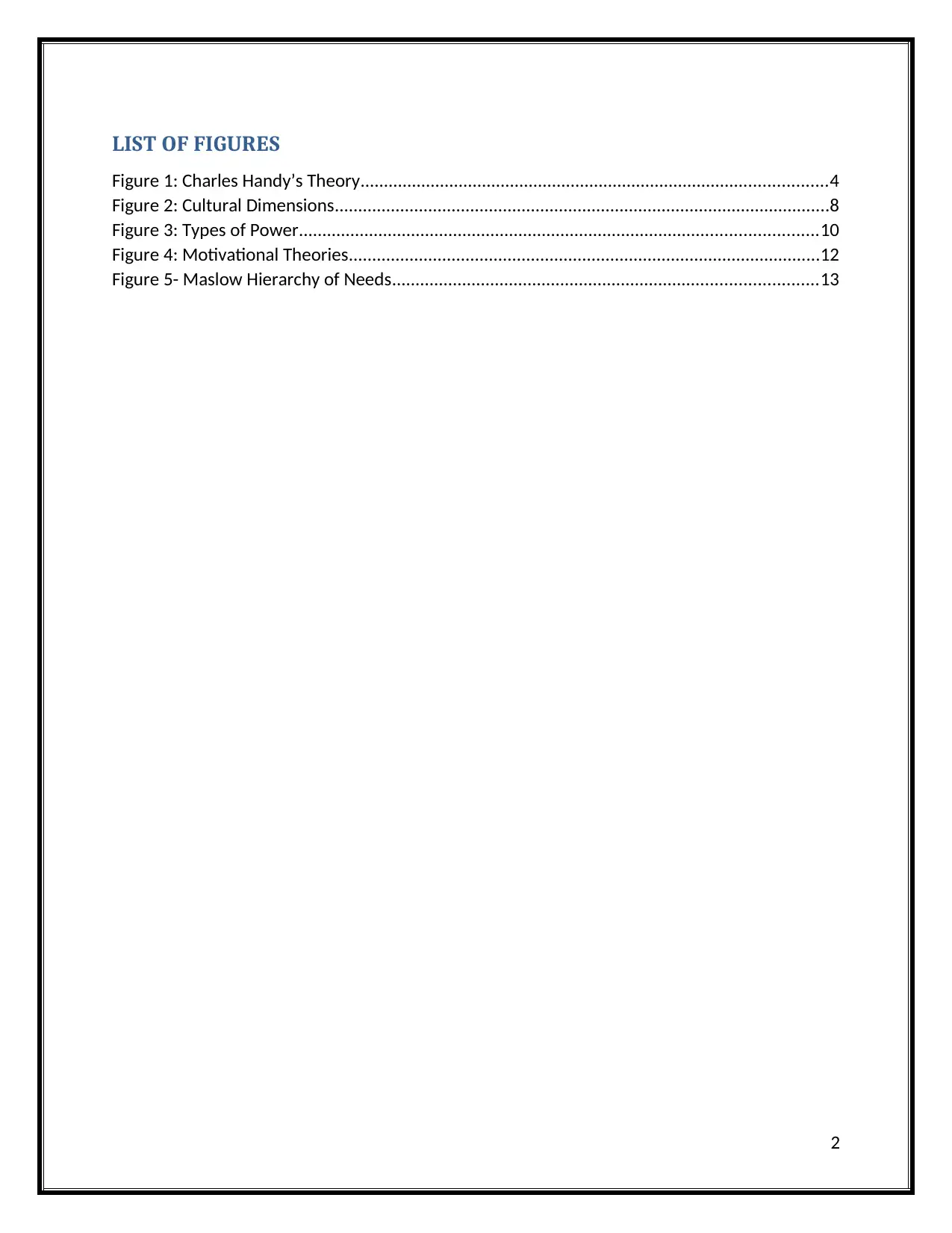
LIST OF FIGURES
Figure 1: Charles Handy’s Theory....................................................................................................4
Figure 2: Cultural Dimensions..........................................................................................................8
Figure 3: Types of Power...............................................................................................................10
Figure 4: Motivational Theories.....................................................................................................12
Figure 5- Maslow Hierarchy of Needs...........................................................................................13
2
Figure 1: Charles Handy’s Theory....................................................................................................4
Figure 2: Cultural Dimensions..........................................................................................................8
Figure 3: Types of Power...............................................................................................................10
Figure 4: Motivational Theories.....................................................................................................12
Figure 5- Maslow Hierarchy of Needs...........................................................................................13
2
⊘ This is a preview!⊘
Do you want full access?
Subscribe today to unlock all pages.

Trusted by 1+ million students worldwide
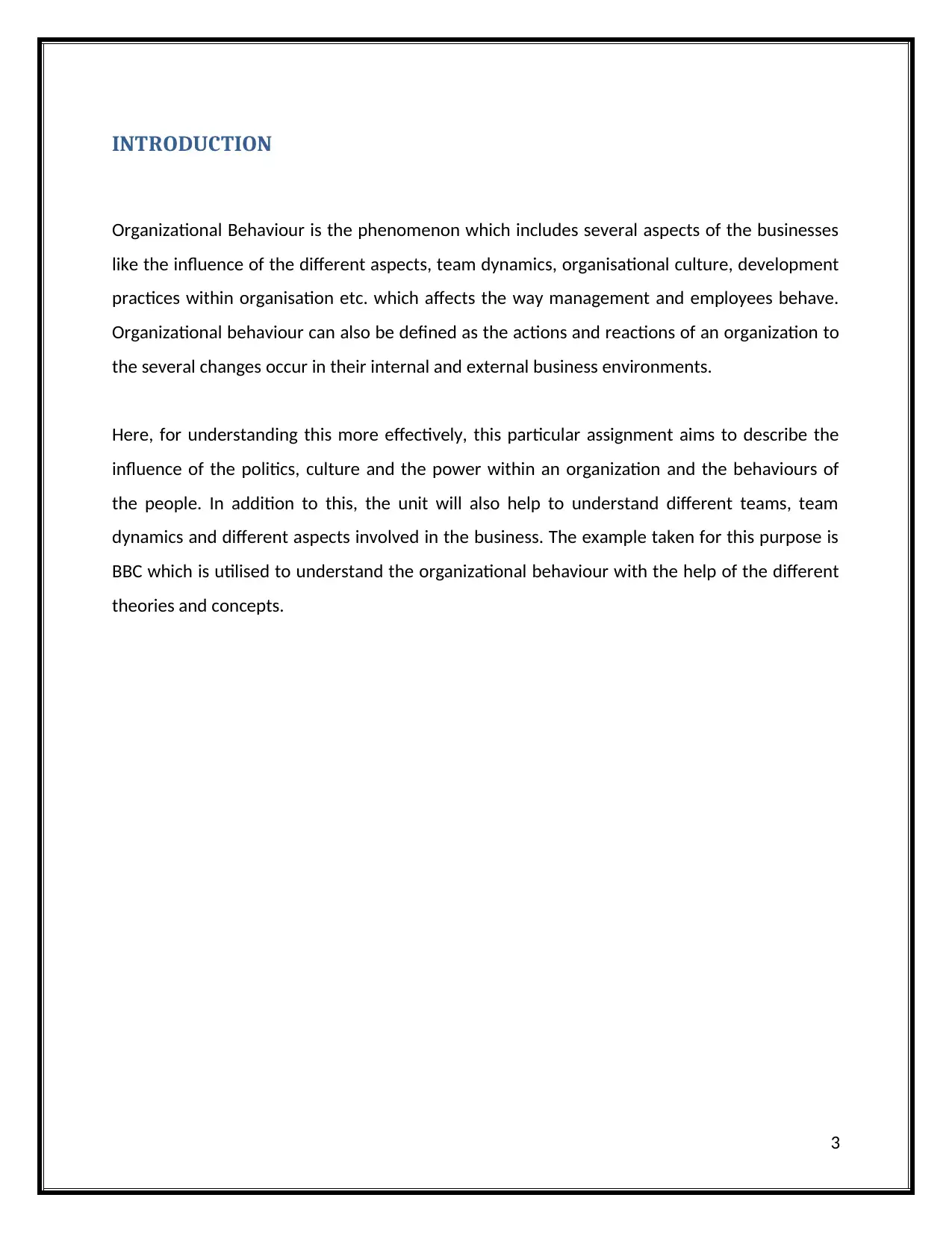
INTRODUCTION
Organizational Behaviour is the phenomenon which includes several aspects of the businesses
like the influence of the different aspects, team dynamics, organisational culture, development
practices within organisation etc. which affects the way management and employees behave.
Organizational behaviour can also be defined as the actions and reactions of an organization to
the several changes occur in their internal and external business environments.
Here, for understanding this more effectively, this particular assignment aims to describe the
influence of the politics, culture and the power within an organization and the behaviours of
the people. In addition to this, the unit will also help to understand different teams, team
dynamics and different aspects involved in the business. The example taken for this purpose is
BBC which is utilised to understand the organizational behaviour with the help of the different
theories and concepts.
3
Organizational Behaviour is the phenomenon which includes several aspects of the businesses
like the influence of the different aspects, team dynamics, organisational culture, development
practices within organisation etc. which affects the way management and employees behave.
Organizational behaviour can also be defined as the actions and reactions of an organization to
the several changes occur in their internal and external business environments.
Here, for understanding this more effectively, this particular assignment aims to describe the
influence of the politics, culture and the power within an organization and the behaviours of
the people. In addition to this, the unit will also help to understand different teams, team
dynamics and different aspects involved in the business. The example taken for this purpose is
BBC which is utilised to understand the organizational behaviour with the help of the different
theories and concepts.
3
Paraphrase This Document
Need a fresh take? Get an instant paraphrase of this document with our AI Paraphraser
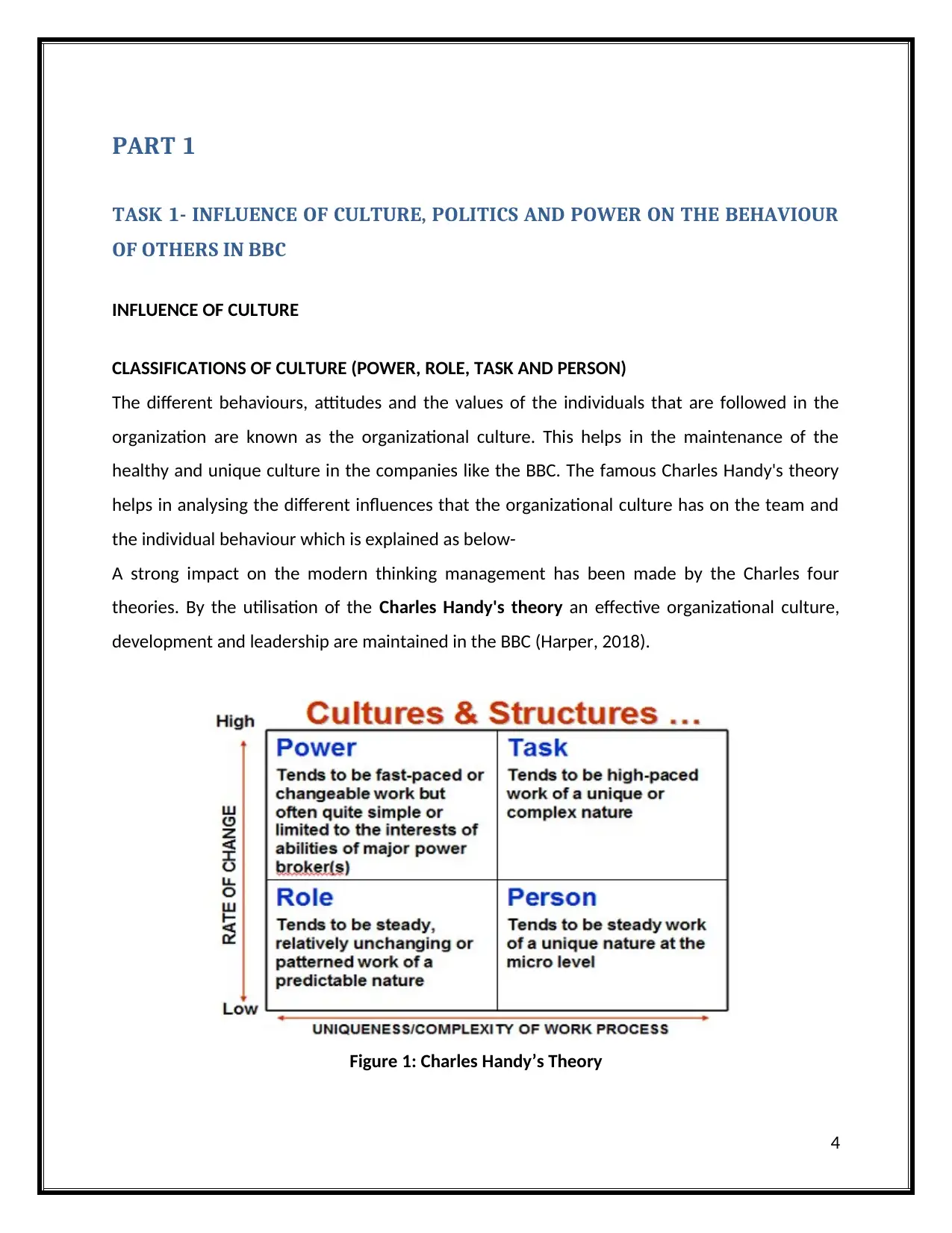
PART 1
TASK 1- INFLUENCE OF CULTURE, POLITICS AND POWER ON THE BEHAVIOUR
OF OTHERS IN BBC
INFLUENCE OF CULTURE
CLASSIFICATIONS OF CULTURE (POWER, ROLE, TASK AND PERSON)
The different behaviours, attitudes and the values of the individuals that are followed in the
organization are known as the organizational culture. This helps in the maintenance of the
healthy and unique culture in the companies like the BBC. The famous Charles Handy's theory
helps in analysing the different influences that the organizational culture has on the team and
the individual behaviour which is explained as below-
A strong impact on the modern thinking management has been made by the Charles four
theories. By the utilisation of the Charles Handy's theory an effective organizational culture,
development and leadership are maintained in the BBC (Harper, 2018).
Figure 1: Charles Handy’s Theory
4
TASK 1- INFLUENCE OF CULTURE, POLITICS AND POWER ON THE BEHAVIOUR
OF OTHERS IN BBC
INFLUENCE OF CULTURE
CLASSIFICATIONS OF CULTURE (POWER, ROLE, TASK AND PERSON)
The different behaviours, attitudes and the values of the individuals that are followed in the
organization are known as the organizational culture. This helps in the maintenance of the
healthy and unique culture in the companies like the BBC. The famous Charles Handy's theory
helps in analysing the different influences that the organizational culture has on the team and
the individual behaviour which is explained as below-
A strong impact on the modern thinking management has been made by the Charles four
theories. By the utilisation of the Charles Handy's theory an effective organizational culture,
development and leadership are maintained in the BBC (Harper, 2018).
Figure 1: Charles Handy’s Theory
4
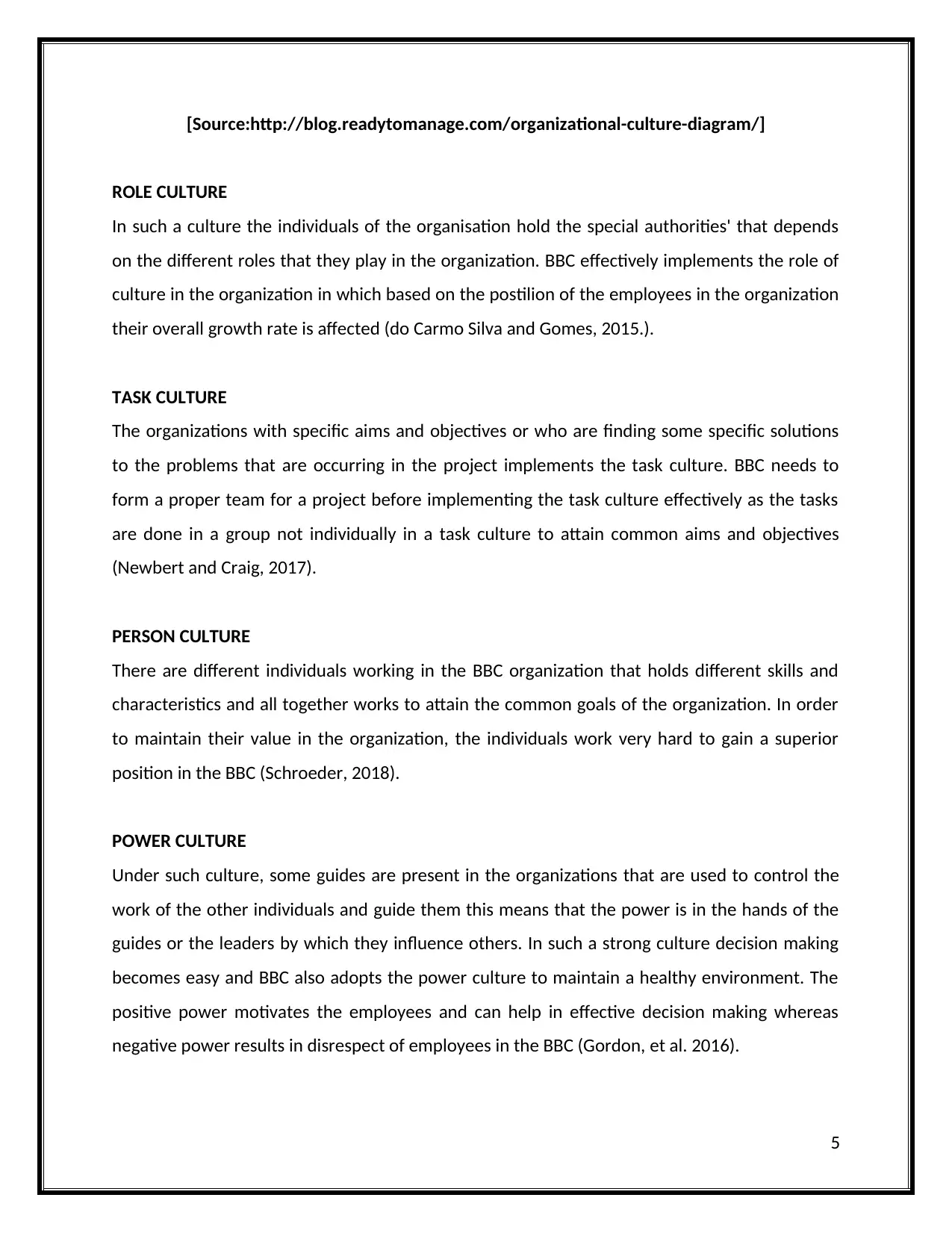
[Source:http://blog.readytomanage.com/organizational-culture-diagram/]
ROLE CULTURE
In such a culture the individuals of the organisation hold the special authorities' that depends
on the different roles that they play in the organization. BBC effectively implements the role of
culture in the organization in which based on the postilion of the employees in the organization
their overall growth rate is affected (do Carmo Silva and Gomes, 2015.).
TASK CULTURE
The organizations with specific aims and objectives or who are finding some specific solutions
to the problems that are occurring in the project implements the task culture. BBC needs to
form a proper team for a project before implementing the task culture effectively as the tasks
are done in a group not individually in a task culture to attain common aims and objectives
(Newbert and Craig, 2017).
PERSON CULTURE
There are different individuals working in the BBC organization that holds different skills and
characteristics and all together works to attain the common goals of the organization. In order
to maintain their value in the organization, the individuals work very hard to gain a superior
position in the BBC (Schroeder, 2018).
POWER CULTURE
Under such culture, some guides are present in the organizations that are used to control the
work of the other individuals and guide them this means that the power is in the hands of the
guides or the leaders by which they influence others. In such a strong culture decision making
becomes easy and BBC also adopts the power culture to maintain a healthy environment. The
positive power motivates the employees and can help in effective decision making whereas
negative power results in disrespect of employees in the BBC (Gordon, et al. 2016).
5
ROLE CULTURE
In such a culture the individuals of the organisation hold the special authorities' that depends
on the different roles that they play in the organization. BBC effectively implements the role of
culture in the organization in which based on the postilion of the employees in the organization
their overall growth rate is affected (do Carmo Silva and Gomes, 2015.).
TASK CULTURE
The organizations with specific aims and objectives or who are finding some specific solutions
to the problems that are occurring in the project implements the task culture. BBC needs to
form a proper team for a project before implementing the task culture effectively as the tasks
are done in a group not individually in a task culture to attain common aims and objectives
(Newbert and Craig, 2017).
PERSON CULTURE
There are different individuals working in the BBC organization that holds different skills and
characteristics and all together works to attain the common goals of the organization. In order
to maintain their value in the organization, the individuals work very hard to gain a superior
position in the BBC (Schroeder, 2018).
POWER CULTURE
Under such culture, some guides are present in the organizations that are used to control the
work of the other individuals and guide them this means that the power is in the hands of the
guides or the leaders by which they influence others. In such a strong culture decision making
becomes easy and BBC also adopts the power culture to maintain a healthy environment. The
positive power motivates the employees and can help in effective decision making whereas
negative power results in disrespect of employees in the BBC (Gordon, et al. 2016).
5
⊘ This is a preview!⊘
Do you want full access?
Subscribe today to unlock all pages.

Trusted by 1+ million students worldwide
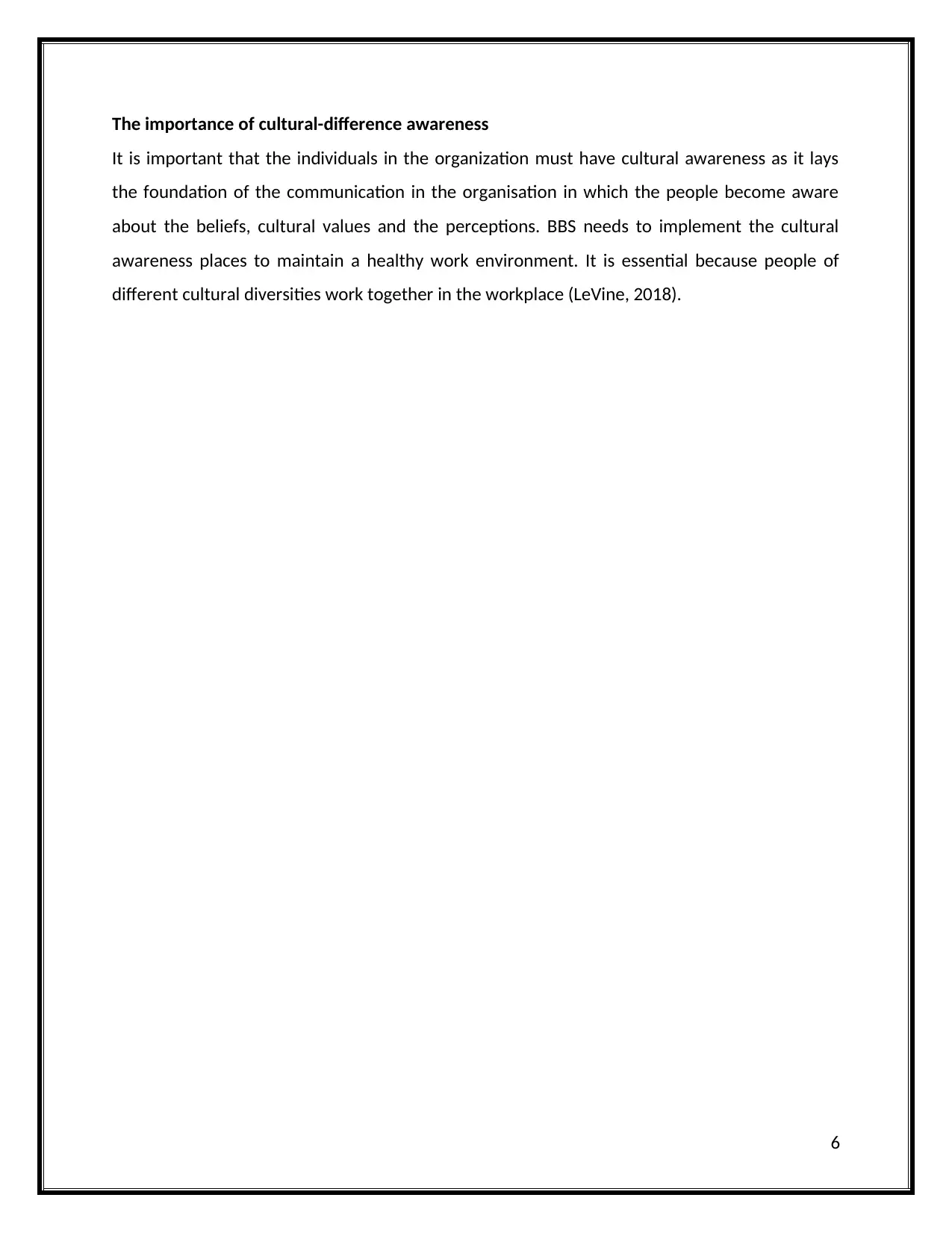
The importance of cultural-difference awareness
It is important that the individuals in the organization must have cultural awareness as it lays
the foundation of the communication in the organisation in which the people become aware
about the beliefs, cultural values and the perceptions. BBS needs to implement the cultural
awareness places to maintain a healthy work environment. It is essential because people of
different cultural diversities work together in the workplace (LeVine, 2018).
6
It is important that the individuals in the organization must have cultural awareness as it lays
the foundation of the communication in the organisation in which the people become aware
about the beliefs, cultural values and the perceptions. BBS needs to implement the cultural
awareness places to maintain a healthy work environment. It is essential because people of
different cultural diversities work together in the workplace (LeVine, 2018).
6
Paraphrase This Document
Need a fresh take? Get an instant paraphrase of this document with our AI Paraphraser
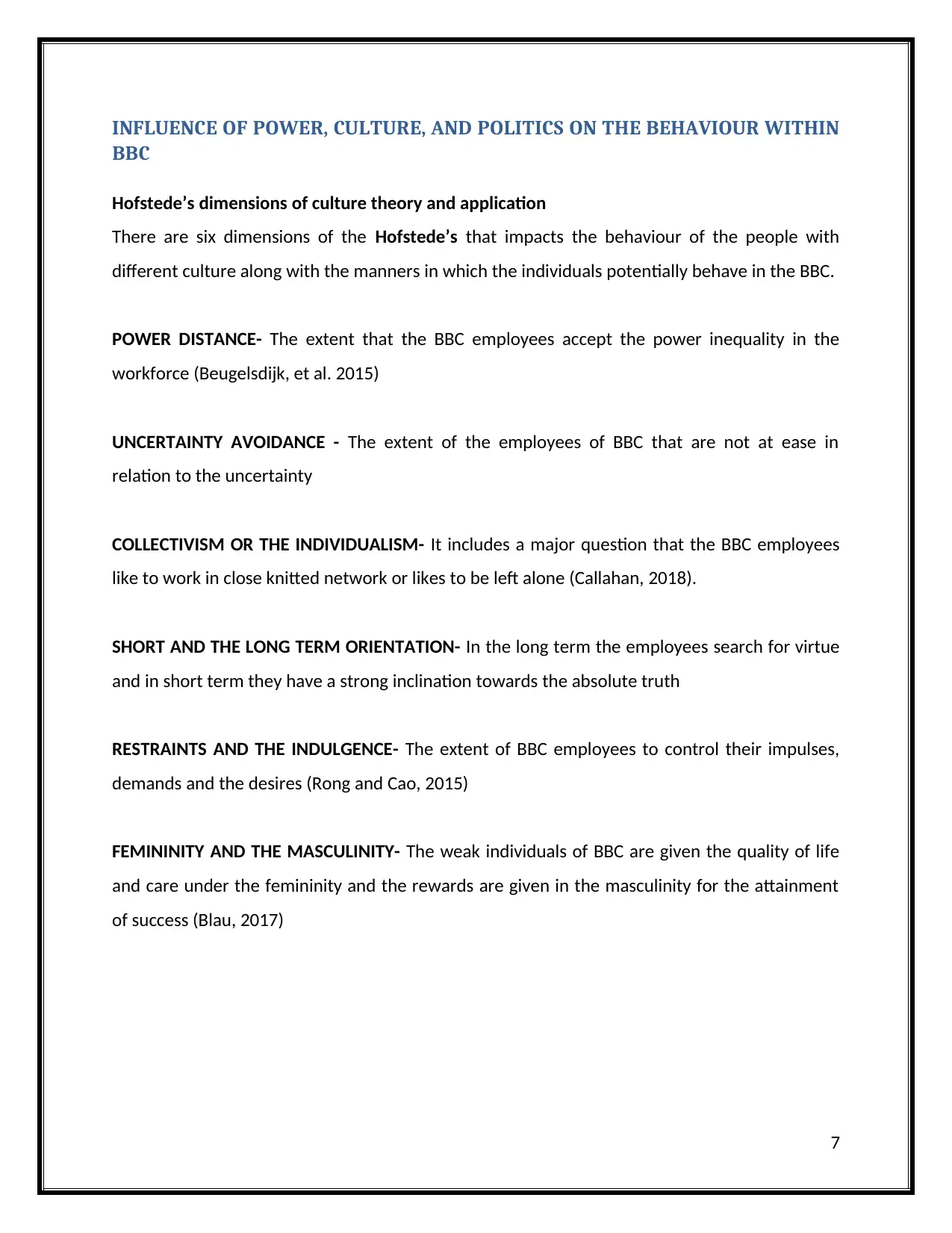
INFLUENCE OF POWER, CULTURE, AND POLITICS ON THE BEHAVIOUR WITHIN
BBC
Hofstede’s dimensions of culture theory and application
There are six dimensions of the Hofstede’s that impacts the behaviour of the people with
different culture along with the manners in which the individuals potentially behave in the BBC.
POWER DISTANCE- The extent that the BBC employees accept the power inequality in the
workforce (Beugelsdijk, et al. 2015)
UNCERTAINTY AVOIDANCE - The extent of the employees of BBC that are not at ease in
relation to the uncertainty
COLLECTIVISM OR THE INDIVIDUALISM- It includes a major question that the BBC employees
like to work in close knitted network or likes to be left alone (Callahan, 2018).
SHORT AND THE LONG TERM ORIENTATION- In the long term the employees search for virtue
and in short term they have a strong inclination towards the absolute truth
RESTRAINTS AND THE INDULGENCE- The extent of BBC employees to control their impulses,
demands and the desires (Rong and Cao, 2015)
FEMININITY AND THE MASCULINITY- The weak individuals of BBC are given the quality of life
and care under the femininity and the rewards are given in the masculinity for the attainment
of success (Blau, 2017)
7
BBC
Hofstede’s dimensions of culture theory and application
There are six dimensions of the Hofstede’s that impacts the behaviour of the people with
different culture along with the manners in which the individuals potentially behave in the BBC.
POWER DISTANCE- The extent that the BBC employees accept the power inequality in the
workforce (Beugelsdijk, et al. 2015)
UNCERTAINTY AVOIDANCE - The extent of the employees of BBC that are not at ease in
relation to the uncertainty
COLLECTIVISM OR THE INDIVIDUALISM- It includes a major question that the BBC employees
like to work in close knitted network or likes to be left alone (Callahan, 2018).
SHORT AND THE LONG TERM ORIENTATION- In the long term the employees search for virtue
and in short term they have a strong inclination towards the absolute truth
RESTRAINTS AND THE INDULGENCE- The extent of BBC employees to control their impulses,
demands and the desires (Rong and Cao, 2015)
FEMININITY AND THE MASCULINITY- The weak individuals of BBC are given the quality of life
and care under the femininity and the rewards are given in the masculinity for the attainment
of success (Blau, 2017)
7
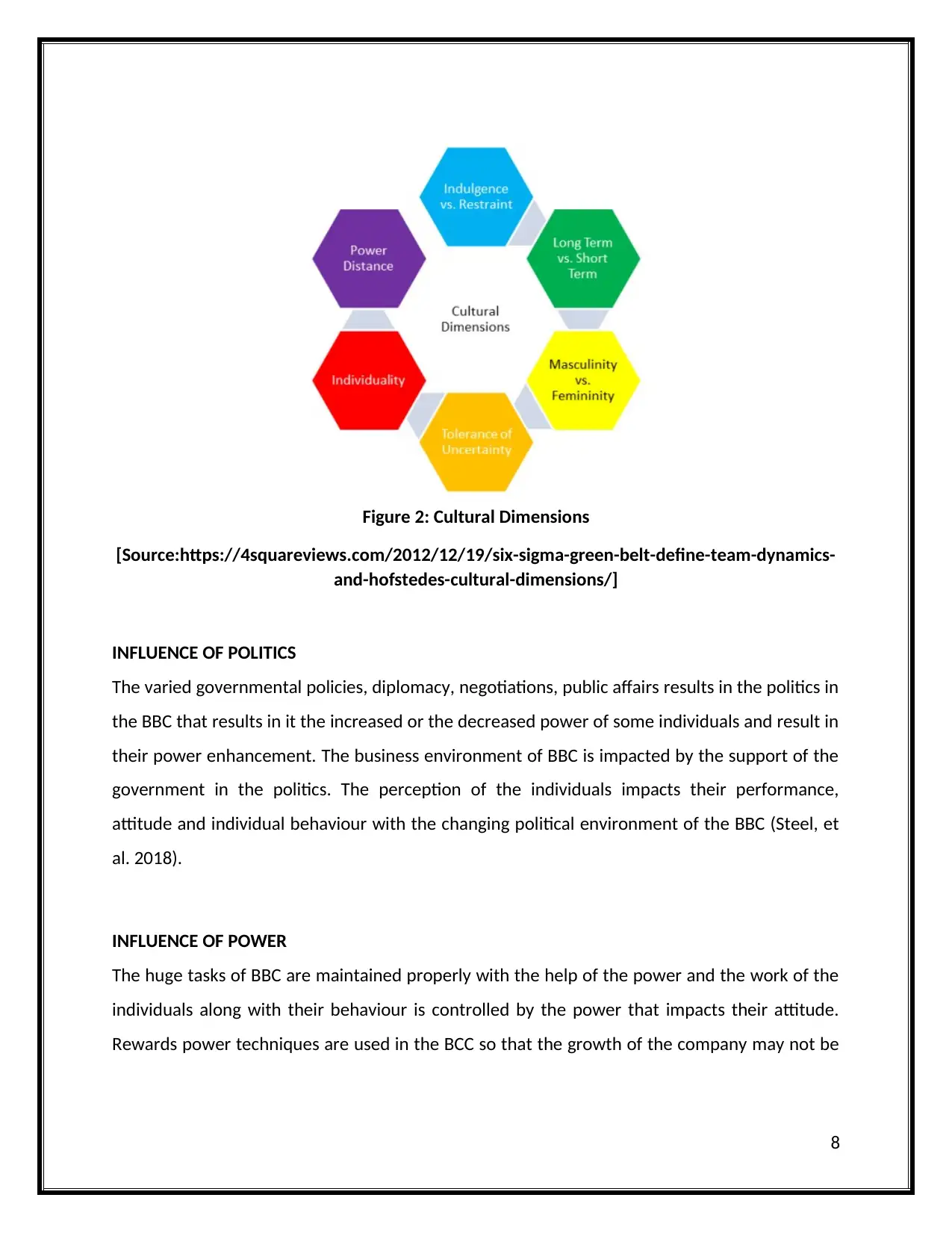
Figure 2: Cultural Dimensions
[Source:https://4squareviews.com/2012/12/19/six-sigma-green-belt-define-team-dynamics-
and-hofstedes-cultural-dimensions/]
INFLUENCE OF POLITICS
The varied governmental policies, diplomacy, negotiations, public affairs results in the politics in
the BBC that results in it the increased or the decreased power of some individuals and result in
their power enhancement. The business environment of BBC is impacted by the support of the
government in the politics. The perception of the individuals impacts their performance,
attitude and individual behaviour with the changing political environment of the BBC (Steel, et
al. 2018).
INFLUENCE OF POWER
The huge tasks of BBC are maintained properly with the help of the power and the work of the
individuals along with their behaviour is controlled by the power that impacts their attitude.
Rewards power techniques are used in the BCC so that the growth of the company may not be
8
[Source:https://4squareviews.com/2012/12/19/six-sigma-green-belt-define-team-dynamics-
and-hofstedes-cultural-dimensions/]
INFLUENCE OF POLITICS
The varied governmental policies, diplomacy, negotiations, public affairs results in the politics in
the BBC that results in it the increased or the decreased power of some individuals and result in
their power enhancement. The business environment of BBC is impacted by the support of the
government in the politics. The perception of the individuals impacts their performance,
attitude and individual behaviour with the changing political environment of the BBC (Steel, et
al. 2018).
INFLUENCE OF POWER
The huge tasks of BBC are maintained properly with the help of the power and the work of the
individuals along with their behaviour is controlled by the power that impacts their attitude.
Rewards power techniques are used in the BCC so that the growth of the company may not be
8
⊘ This is a preview!⊘
Do you want full access?
Subscribe today to unlock all pages.

Trusted by 1+ million students worldwide
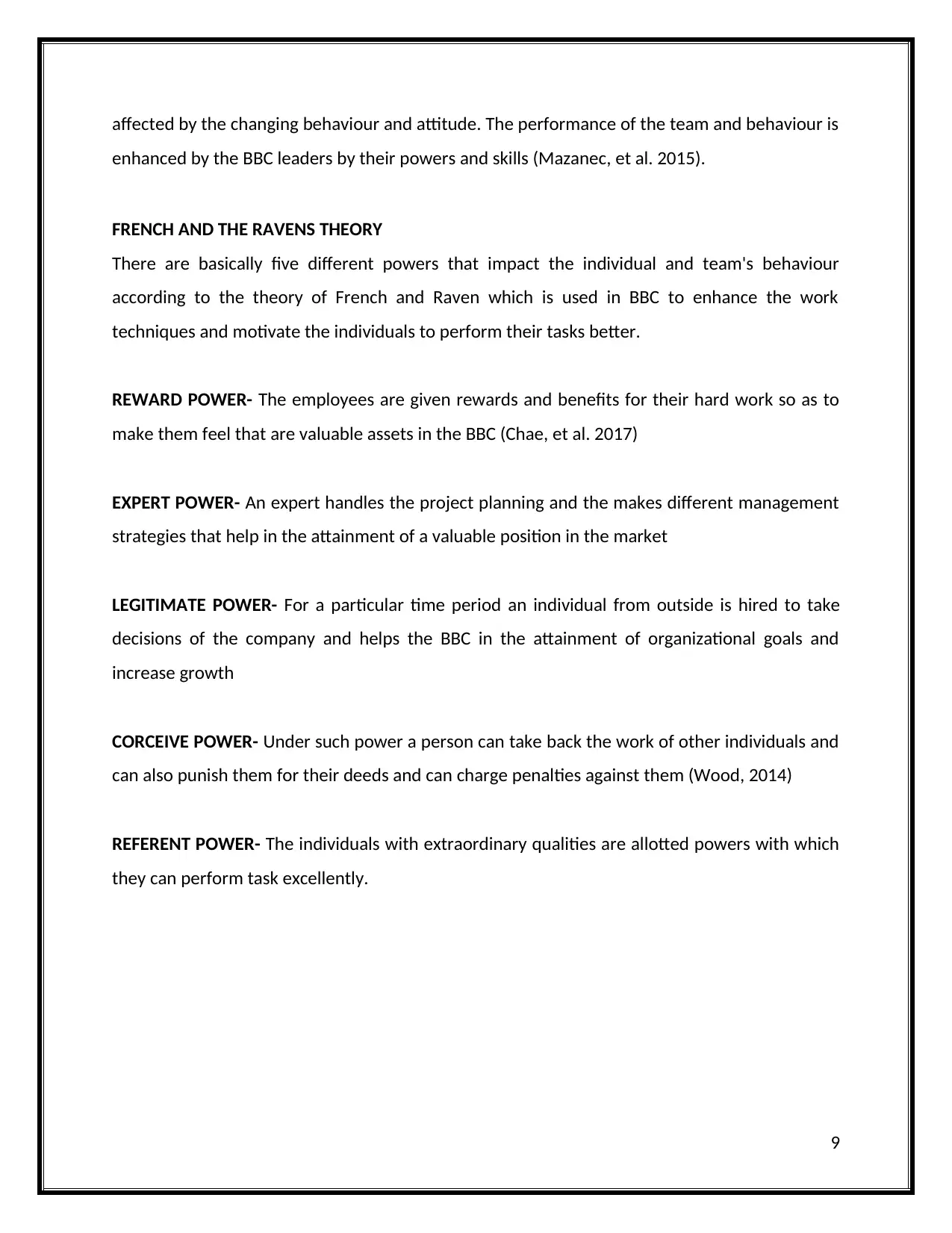
affected by the changing behaviour and attitude. The performance of the team and behaviour is
enhanced by the BBC leaders by their powers and skills (Mazanec, et al. 2015).
FRENCH AND THE RAVENS THEORY
There are basically five different powers that impact the individual and team's behaviour
according to the theory of French and Raven which is used in BBC to enhance the work
techniques and motivate the individuals to perform their tasks better.
REWARD POWER- The employees are given rewards and benefits for their hard work so as to
make them feel that are valuable assets in the BBC (Chae, et al. 2017)
EXPERT POWER- An expert handles the project planning and the makes different management
strategies that help in the attainment of a valuable position in the market
LEGITIMATE POWER- For a particular time period an individual from outside is hired to take
decisions of the company and helps the BBC in the attainment of organizational goals and
increase growth
CORCEIVE POWER- Under such power a person can take back the work of other individuals and
can also punish them for their deeds and can charge penalties against them (Wood, 2014)
REFERENT POWER- The individuals with extraordinary qualities are allotted powers with which
they can perform task excellently.
9
enhanced by the BBC leaders by their powers and skills (Mazanec, et al. 2015).
FRENCH AND THE RAVENS THEORY
There are basically five different powers that impact the individual and team's behaviour
according to the theory of French and Raven which is used in BBC to enhance the work
techniques and motivate the individuals to perform their tasks better.
REWARD POWER- The employees are given rewards and benefits for their hard work so as to
make them feel that are valuable assets in the BBC (Chae, et al. 2017)
EXPERT POWER- An expert handles the project planning and the makes different management
strategies that help in the attainment of a valuable position in the market
LEGITIMATE POWER- For a particular time period an individual from outside is hired to take
decisions of the company and helps the BBC in the attainment of organizational goals and
increase growth
CORCEIVE POWER- Under such power a person can take back the work of other individuals and
can also punish them for their deeds and can charge penalties against them (Wood, 2014)
REFERENT POWER- The individuals with extraordinary qualities are allotted powers with which
they can perform task excellently.
9
Paraphrase This Document
Need a fresh take? Get an instant paraphrase of this document with our AI Paraphraser
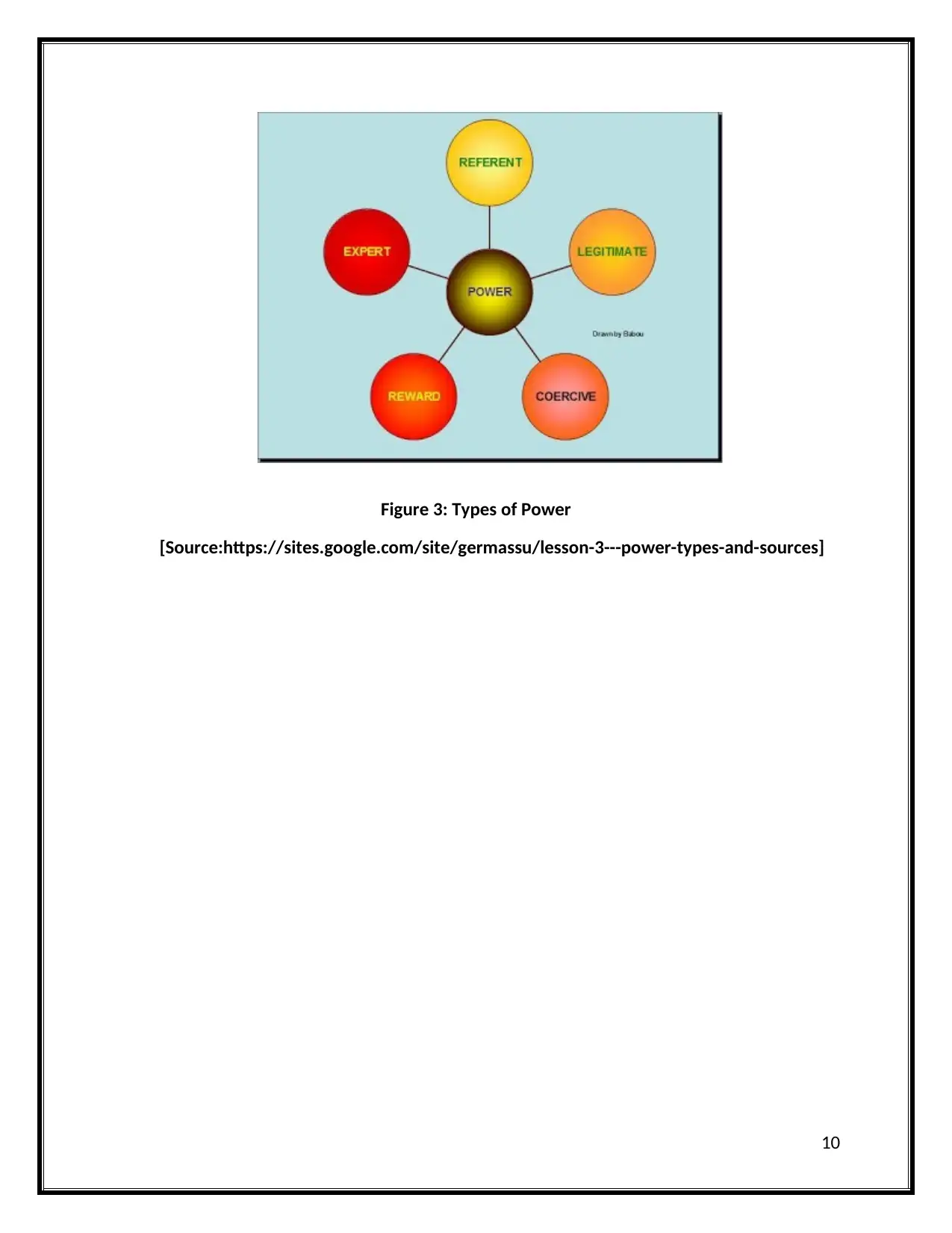
Figure 3: Types of Power
[Source:https://sites.google.com/site/germassu/lesson-3---power-types-and-sources]
10
[Source:https://sites.google.com/site/germassu/lesson-3---power-types-and-sources]
10
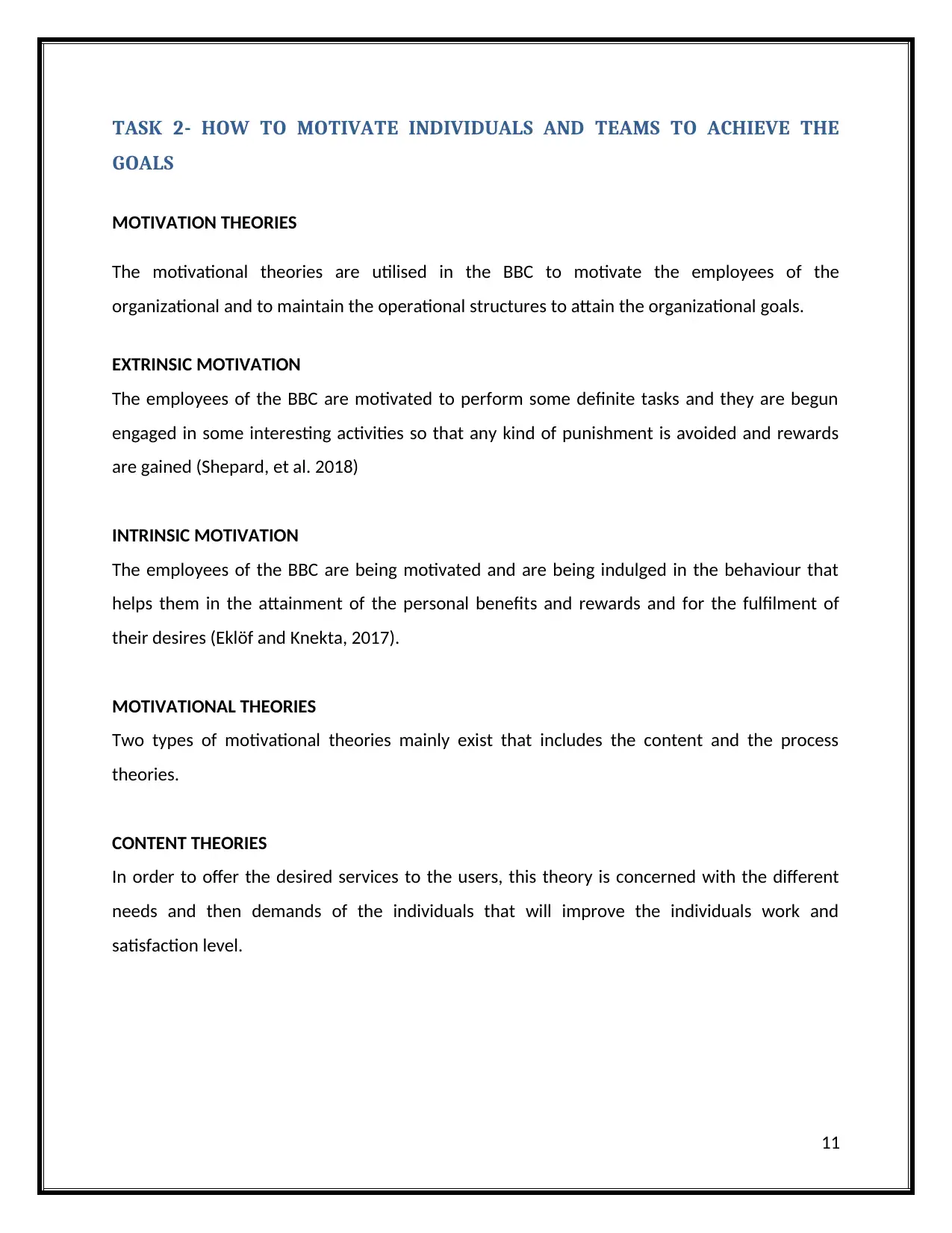
TASK 2- HOW TO MOTIVATE INDIVIDUALS AND TEAMS TO ACHIEVE THE
GOALS
MOTIVATION THEORIES
The motivational theories are utilised in the BBC to motivate the employees of the
organizational and to maintain the operational structures to attain the organizational goals.
EXTRINSIC MOTIVATION
The employees of the BBC are motivated to perform some definite tasks and they are begun
engaged in some interesting activities so that any kind of punishment is avoided and rewards
are gained (Shepard, et al. 2018)
INTRINSIC MOTIVATION
The employees of the BBC are being motivated and are being indulged in the behaviour that
helps them in the attainment of the personal benefits and rewards and for the fulfilment of
their desires (Eklöf and Knekta, 2017).
MOTIVATIONAL THEORIES
Two types of motivational theories mainly exist that includes the content and the process
theories.
CONTENT THEORIES
In order to offer the desired services to the users, this theory is concerned with the different
needs and then demands of the individuals that will improve the individuals work and
satisfaction level.
11
GOALS
MOTIVATION THEORIES
The motivational theories are utilised in the BBC to motivate the employees of the
organizational and to maintain the operational structures to attain the organizational goals.
EXTRINSIC MOTIVATION
The employees of the BBC are motivated to perform some definite tasks and they are begun
engaged in some interesting activities so that any kind of punishment is avoided and rewards
are gained (Shepard, et al. 2018)
INTRINSIC MOTIVATION
The employees of the BBC are being motivated and are being indulged in the behaviour that
helps them in the attainment of the personal benefits and rewards and for the fulfilment of
their desires (Eklöf and Knekta, 2017).
MOTIVATIONAL THEORIES
Two types of motivational theories mainly exist that includes the content and the process
theories.
CONTENT THEORIES
In order to offer the desired services to the users, this theory is concerned with the different
needs and then demands of the individuals that will improve the individuals work and
satisfaction level.
11
⊘ This is a preview!⊘
Do you want full access?
Subscribe today to unlock all pages.

Trusted by 1+ million students worldwide
1 out of 30
Related Documents
Your All-in-One AI-Powered Toolkit for Academic Success.
+13062052269
info@desklib.com
Available 24*7 on WhatsApp / Email
![[object Object]](/_next/static/media/star-bottom.7253800d.svg)
Unlock your academic potential
Copyright © 2020–2026 A2Z Services. All Rights Reserved. Developed and managed by ZUCOL.





